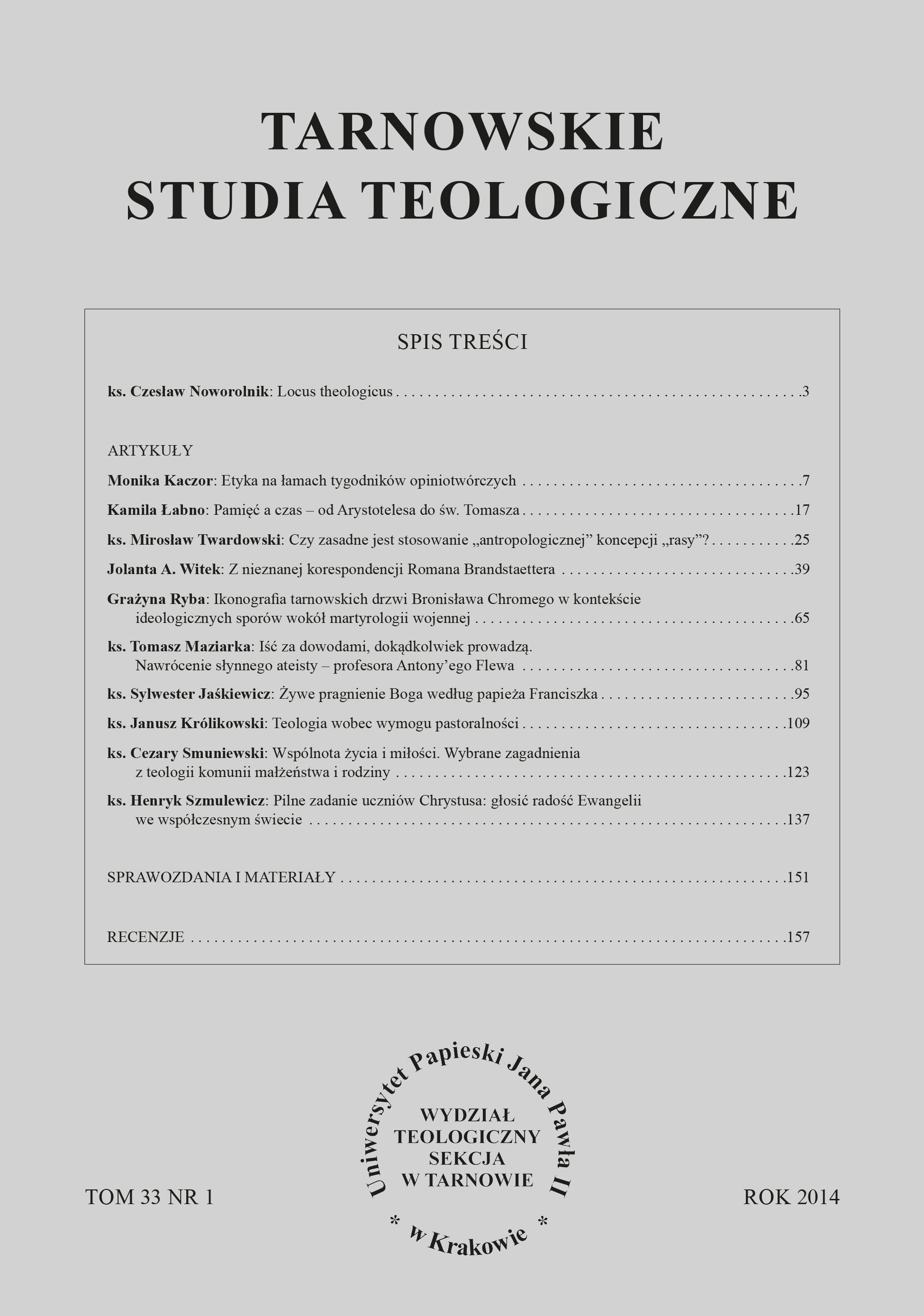Follow the Evidences Wherever They Lead.Conversion of the Famous Atheist – Professor Antony Flew
DOI:
https://doi.org/10.15633/tst.715Keywords:
Antony Flew, arguments for God’s existence, atheism, conversion, theismAbstract
This article presents Antony Flew’ s intellectual journey from atheism to the faith in God. The first part of this article contains criticism of theism which Flew presented in several widely discussed works. The second part refers to three arguments which in the opinion of the philosopher argue for the existence of God. The first of them concerns the existence of the laws of nature and it can be expressed as a question: Where are the laws of nature from? The second is connected with the origin of life: How did life emerge from the dead matter? Finally, the third reason is the existence of the world: Why does the world exist? The theistic point of view, the fruit of the intellectual inquiries, the convert’s words enclose briefly: “I believe that the universe was brought into existence by an infinite Intelligence. I believe that the right of forming intricate structure of the universe is an expression of what scientists refer to as the 'Mind of God'. I believe that the phenomenon of life and its ability to reproduce has its source in God.”
References
Bartholomew D. J., God, chance and purpose. Can God have it both ways?, Cambridge 2008.
Cameron R., Aristotle on the animate: problems and prospects, “Bios: Epistemological and philosophical foundation of life sciences” Febr. 2006, s. 23–24.
Conway D., The rediscovery of wisdom, London 2000.
Coplestone F., Philosophers and philosophies, London 1996.
Crombie I. M., The possibility of theological statements, w: Faith and reason, ed. B. Mitchell, London 1957.
Dembski W. A., In defence of Inteligence Design, w: Religion and science, ed. P. Clayton, Z. Simpson, Oxford 2008.
Einstein A., Ideas and opinions, New York 1973.
Flew A., God and philosophy, London 1966.
Flew A., Hume’s philosophy of belief, Routledge Kegan Paul, 1961.
Flew A., Presumption of Atheism, “Canadian Journal of Philosophy” September 1972 vol. 2 no. 1, s. 29–46, http://dx.doi.org/10.1080/00455091.1972.10716861.
Flew A., Theology and falsification, w: Reason and responsibility: Readings in some basic problems of philosophy, ed. J. Feinberg, Belmont 1968.
Flew A., There is a God: How the world’s most notorious atheist changed his mind, New York [2007]; polski przekład: Bóg istnieje. Dlaczego najsłynniejszy ateista zmienił swój światopogląd?, tłum. Robert Pucek, Warszawa 2010.
Flew A., Theology and falsification, w: Reason and responsibility. Readings in some basic problems of philosophy, ed. J. Feinberg, Belmont 1968, s. 48–49; polski przekład: Flew A., Teologia a falsyfikacja, w: Filozofia religii, red. B. Chwedeńczuk, tłum. M. Szczubiałka, Warszawa 1997.
Flew A., Hare R. M., Mitchen B., Theology and falsification, w: The philosophy of religion, ed. B. Mitchen, Oxford 1971, s. 13–22.
Haldane J., Preface to the second edition, w: Atheism and theism, ed. J. J. C. Smarth, J. Haldane, Oxford 2003.
Hawking S., Krótka historia czasu, tłum. P. Amsterdamski, Warszawa 1990.
Heimbeck R., Theology and meaning, London 1969.
Heller M., Filozofia przypadku. Kosmiczna fuga z preludium i kodą, Kraków 2011.
Kenny A., Feith and reason, New York 1983.
Leftow B., Time and eternity, Ithaca 1991.
Leslie J., Infinite minds, Oxford 2001.
Mackie J. L., Cud teizmu. Argumenty za istnieniem Boga, tłum. B. Chwedeńczuk, Warszawa 1997.
Mascall E. L., The openness of being: Natural theology today, London 1971; polski przekład: Otwartość bytu, tłum. S. Zalewski, Warszawa 1988.
Plantinga A., Warranted Christian belief, New York 2000.
Swinburne R., Spójność teizmu, Znak, 1995.
Swinburne R., The existence of God, Oxford 2011.
Swinburne R., The limits of explanation, w: Explanation and its limits, ed. D. Knowles, Cambridge 1990.
Tracy T., God, action and embodiment, Grand Rapids 1984.
Tracy T., The God who acts, University Park 1994.
Wald G., Life and mind in the universe, w: Cosmos, bios, theos, ed. H. Margenau, R. A. Varghese, La Salle 1992.
Downloads
Published
Issue
Section
License
Authors who publish with this journal agree to the following terms:
- Authors retain the copyright and full publishing rights without restrictions, and grant the journal right of first publication with the work simultaneously licensed under a Creative Commons Attribution 4.0 International License that allows others to share the work with an acknowledgement of the work's authorship and initial publication in this journal.
- Authors are able to enter into separate, additional contractual arrangements for the non-exclusive distribution of the journal's published version of the work (e.g., post it to an institutional repository or publish it in a book), with an acknowledgement of its initial publication in this journal.
- Authors are permitted and encouraged to post their work online (e.g., in institutional repositories or on their website) prior to and during the submission process, as it can lead to productive exchanges, as well as earlier and greater citation of published work (See The Effect of Open Access).

